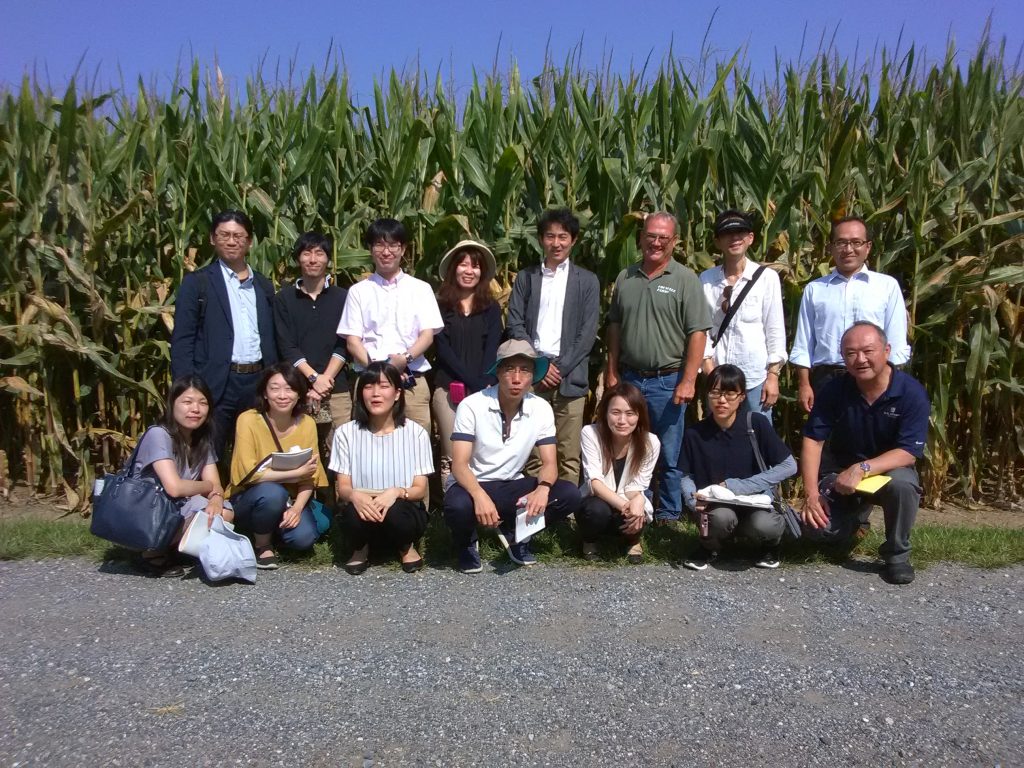Two trade teams visiting the United States from Japan this August is one part of an ongoing effort by the U.S. Grains Council (USGC) and partner organizations to keep government regulators and reviewers in key grains importing countries informed about new U.S. seed technology and the U.S. regulatory process.
The teams, which will travel throughout the Midwest, are intended to keep officials from those countries informed about new traits from U.S. seed technology providers and help them stay in touch with their U.S. counterparts, all of which will help to ensure uninterrupted trade to two of the Council’s largest and most loyal markets.
“The Council works to continuously educate stakeholders on global regulatory trends and the latest in U.S. corn production technology,” said Allison Nepveux, USGC manager of trade policy. “Exchanging scientific opinions supports the Council’s long-term goals of sharing resources and maintaining access to these important markets.”
The Council engages overseas on an informational basis with the government regulators who draft and implement laws regarding approvals of biotechnology traits and the reviewers whose recommendations can help or hinder the regulatory process. On the ground in Japan and Taiwan, the Council works to maintain strong relationships with these government officials, but bringing them to the United States facilitates more in-depth discussions with representatives from U.S. regulatory agencies and industry.
Regulatory reviewers work with government officials to make determinations and recommendations on approvals and regulations. Although they are often university or government researchers or other subject matter experts, they may know little about U.S. corn production and marketing. As a result, questions raised outside the scope of a risk assessment or final recommendations could slow down the entire approval or regulatory process.
“Providing information to these biotech experts helps reduce technical barriers that could cause unnecessary delays in biotech trait reviews,” Nepveux said. “Doing so prevents the disruption of corn trade between the United States and these two loyal markets.”
A team of Japanese biotech reviewers was in the United States this month for a set of meetings in Iowa and Missouri, organized by the Council in cooperation with the U.S. Embassy in Tokyo.
“These meetings will provide the Japanese reviewers with information on the biotech corn events in the pipeline for entry into the Japanese regulatory system in the near future,” Nepveux said. “These trade teams also allow reviewers to understand how their regulatory approvals and regulations need to be able to work with the real world of U.S. corn production, distribution and exports.”
The second biotech-focused trade team in the United States in August includes government regulators from Japan involved in the food, feed and environmental approvals of corn events. That group will visit both North Carolina and Washington, D.C.
The Council, in cooperation with the U.S. Embassy in Tokyo, organized the team of Japanese regulators to travel to the United States for meetings with U.S. government regulators, U.S. biotech seed companies and industry organizations, U.S. corn farmers and companies involved in the production, distribution and exports of U.S. corn to Japan.
Japan’s government includes an agency rotation program, meaning many individuals are not in any one role longer than two or three years. As a result, the Council must diligently provide continuing education that exposes new regulators to U.S. seed technology processes.
Since the Japanese regulatory system represents a model for other countries in the region, it is critical to ensure these subject matter experts are as up-to-date as possible.
“With regard to biotech approvals, Japan is the gold standard in Asia for a functioning system,” Nepveux said. “Japan has a fairly streamlined system that is rarely bogged down by political interference, an important example for other countries to follow.”
Overall, both of these trade teams represent important audiences for the Council to work with continuously, both in their home countries and in the United States, to keep trade flowing and ensure U.S. producers have access to the technological tools they need to produce a reliable and high quality supply of grain.
“The majority of U.S. corn is produced using modern breeding methods – vital tools for growers to overcome production challenges and sustainably produce nutritious and affordable foods,” Nepveux said. “Globally harmonized, science-based regulations in the Japanese and Taiwanese markets help secure growers’ access to these technologies.”
Each team is part of the Council’s proactive approach to addressing biotech-related issues in Japan. The Council will continue to work with these regulators and reviewers when they return to Japan to ensure the countries’ regulatory systems remain science-based, risk-based and well-coordinated with the U.S. system.
Learn more about the Council’s work on biotech issues here.
About The U.S. Grains Council
The U.S. Grains Council develops export markets for U.S. barley, corn, sorghum and related products including distiller’s dried grains with solubles (DDGS) and ethanol. With full-time presence in 28 locations, the Council operates programs in more than 50 countries and the European Union. The Council believes exports are vital to global economic development and to U.S. agriculture’s profitability. Detailed information about the Council and its programs is online at www.grains.org.

